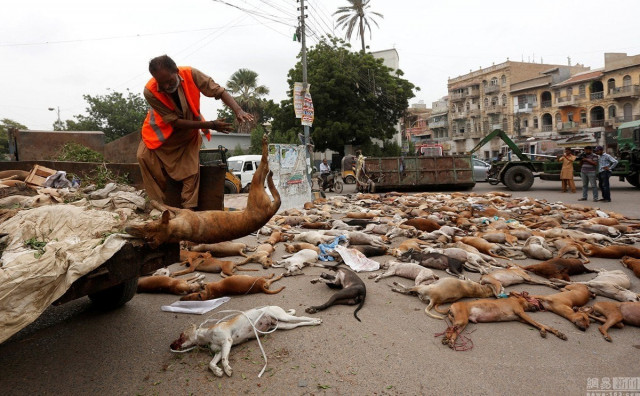Rabies ‘epidemic’ – real issue or excuse for dog culling?
‘It is more a question of how to coexist with dogs’

A municipal worker unloads the bodies of stray dogs from a garbage truck after they were culled using poison by the municipality in Karachi. PHOTO: REUTERS/FILE
The Sindh government’s decision to begin dog culling in the wake of recent rabies-related deaths highlights this collective apathy. At least 469 dogs were killed in the province’s Matiari district alone by the municipal and town administration following the decision.
Many believe that it does not even address the problem in question – rabies.
The tragic death in Larkana of a pre-teen boy, whose final gasps in his mother arms were caught on video that circulated widely on social media, brought rabies back into the country’s focus last month.
The unchecked increase in the number of stray dogs on the streets coupled with the shortage of anti-rabies vaccine (ARV) and rabies immunoglobulin injections, used to cure the disease, has led to a rise in the number of deaths caused by the virus.
69,453 cases of rabies reported in Sindh this year
But does this provide justification for mass culling?
Animal rights activists think otherwise. They strongly criticised the government move and presented alternate solutions to deal with a disease that is “100% curable”.
“It's appalling that local and district authorities routinely poison and shoot stray dogs across the country. This is not a correct approach to manage stray dog population,” Quatrina, a representative from Innocent Pets Shelter Welfare Society, told The Express Tribune.
“The humane and correct manner is TNVR – trap, neuter, vaccinate and release. Besides, there is a critical need to create awareness about animal welfare in Pakistan. We are particularly distressed when nursing mothers are shot or poisoned,” she lamented.
‘Waste management’
According to Pets Shelter Welfare Society, dogs are vital in maintaining ‘organic waste’ balance.
“Given that Pakistan’s organic waste collection is virtually non-existent, strays dogs are critical,” Quatrina maintained. “For instance, imagine the exponential population explosion of rats if it weren’t for stray dogs that keep them in check. Rats carry multiple diseases including rabies and plague,” she explained. “We hope the government endorses public-private partnerships for TNVR programmes all over the country to save dogs… the media can also play a key role in creating awareness in this regard.”
Adoption and vaccination
Animal rights activists urge people to adopt local dogs instead of spending money on foreign breeds since the latter are not suited to local conditions. According to the ACF Animal Rescue, strays have a very short lifespan when they are on the streets but once adopted and given a proper diet and love, the life expectancy goes up to 13-15 years.
“We have a responsibility to protect all living beings and there are better humane ways to tackle the issue of rabies,” said a social media post of Ayesha Chundigar Foundation (ACF) on their official Facebook page. “There is not a rabies epidemic, the panic situation is not real. This is all hype created to justify violence. Every dog bite is not rabies bites, it is more a question of how to coexist with dogs,” it maintained.
The ACF highlights that dogs become aggressive only when they have been exposed to violence and abuse by humans.
The 'rabid' spectre that stalks Pakistan
“If a dog’s tail or ears are chopped off, or a puppy's mother is poisoned in front of him, or a dog is hanged by a telephone pole or has acid thrown on her or pelted by stones or run over by a car or motorbike and left to die or simply shooed away consistently simply for existing, how can you expect the dog to not be aggressive. Wouldn’t you be,” the detailed post further added.
Animal rights activists assert that the problem is not just confined to authorities but rather is a depiction of society’s outlook at large.
Amna Idress, an ardent supporter of animal shelters, says she has seen people demand right to shoot dogs in the name of protecting their children.
“On the grassroots we have this mindset that dogs are impure and from a very young age our children are taught that. There is no compassion in most people whatsoever,” she bemoaned. “Every time someone points out the plight of stray dogs and even donkeys for that matter, people try to trivialise the matter by saying humans suffer too and who has time to care about mere street animals.”
Zawad Khan Durrani, the field operation manager at Todd’s Welfare Society, lamented that stray dogs are treated as pests at large and the government doesn’t find it wise to employ money and time-consuming methods to address their miseries.
“This cruelty is a combination of lack of empathy, misunderstanding of beliefs and prevailing hatred instilled over the years,” said Zawad.
“We have devised a strategy for mass spay/neuter and vaccination campaigns to humanely reduce dog population over a period of four years,” he told The Express Tribune. “So far we have done this to a little over a few hundred dogs and the results have been positive.”
Science behind dog abuse
Explaining human psyche behind dog abuse in public, Karthik Aithal, a passionate animal rights activist said that people get cruel towards animals when they are not at peace with themselves. He insists on educating public to change the mindsets. “Humans want to take out their frustration on weaker beings and in the case of animals they are voiceless,” he explained. “Educating people by leading an example is the key. Let’s teach our children from a very young age that dogs are our friends and not some low rank beings.”
Expert advice
In an attempt to educate the masses about the need to vaccinate dogs, Dr Naseem Salahuddin, specialist in infectious diseases, says that dog vaccinations are considerably cheaper and very much doable. Salahuddin, along with her team, has launched Rabies Free Karachi (RFK) project to vaccinate dogs on a large scale and create public awareness about rabies.
“The RKF is ready to teach and train workers in every township of Karachi. We want civil society, authorities, multinationals, industries and pharmaceuticals to support us through financial assistance and encouragement,” she appeals. “We hope to expand this project to Sindh and other parts of Pakistan and help control dog population.”
The project has been initiated with an aim to eliminate rabies by 2030.



















COMMENTS
Comments are moderated and generally will be posted if they are on-topic and not abusive.
For more information, please see our Comments FAQ